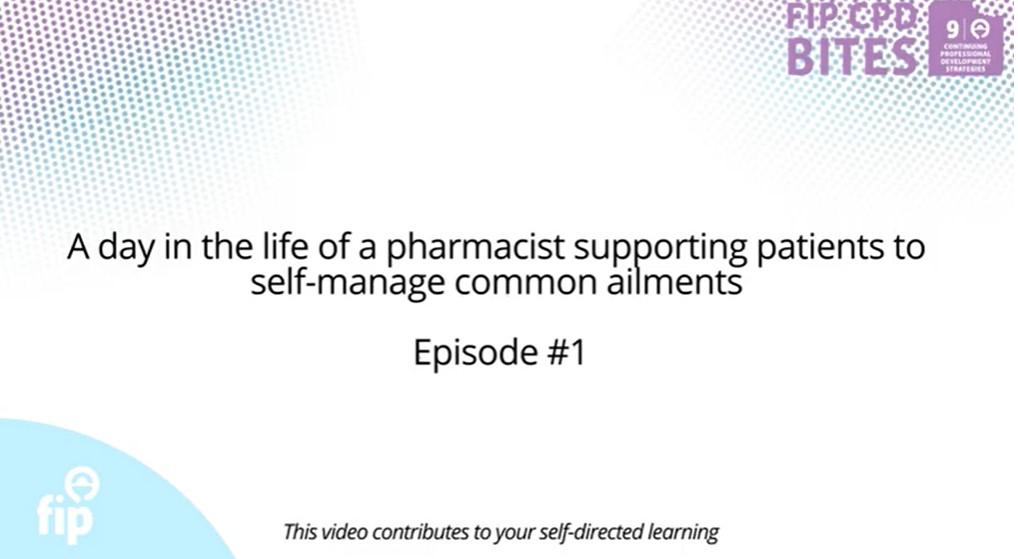A patient-centred approach to managing common ailments in community pharmacy: A guide for early career pharmacists

In this video, Clara Mayunga, community pharmacist in the Netherlands, offers guidance to early-career pharmacists on managing common ailments in community pharmacy.
Beyond medication: Strengthening trust, empathy, and loyalty in pharmacist-patient interactions
This CPD Bites series aims to enhance pharmacists’ communication skills by focusing on core human values essential to patient care: trust, loyalty, and empathy. Through practical, scenario-based learning, the series highlights how effective pharmacist–patient interactions can improve the management of common ailments, support self-care, and foster stronger, more meaningful relationships in everyday pharmacy practice.
For a brief overview of the 3 episodes, please view the summary page here.
Episode 1 – Building trust and rapport
In the first episode, Indre Treciokiene, associate professor, Vilnius University, Lithuania, explores the principles of trust building in patient interactions.
Episode 2 – Fostering loyalty
In the second episode of our series on strengthening trust, empathy and loyalty, Alison Etukakpan, PhD student, Monash University, Australia, addresses factors that drive patient loyalty.
Episode 3 – Demonstrating empathy
In the third episode of our series on strengthening trust, empathy and loyalty, Luna El Bizri, founder and manager, LunaPharm Pharmacy, Lebanon, shares the impact of empathetic communication on patient satisfaction.
Pharmacists’ role in supporting health behaviour change
This series explores the role of pharmacists in changing behaviour to empower self-care and how these link to medicine adherence and other health-related behaviours.
For a brief overview of the episodes and some recommendations, view the summary page here.
Episode 1 – Making health habits last

Episode 2 – The science of behavioural economics

Episode 3 – Models of behavioural change (COM-B)

Episode 4 – Stages of behavioural change model in medicines adherence

Episode 5 – The place of intrinsic motivation in medicine adherence

Episode 6 – The place of extrinsic motivation in medicine adherence

Key self-care concepts
This series aims to describe the key concepts of self-care, expounding on the definition of terms, the importance and role of health literacy and how self–care fits into a broader framework of overall health and well-being.
For a brief overview of the episodes and some recommendations, view the summary page here.
Episode 1 – The seven pillars of self-care

In this episode, Austin El-Osta, Director, Self-care Research Unit, Imperial College London (UK) shares the seven pillars of self-care and explains the interconnectivity of these pillars and their significance to good health. He also proposes how pharmacists can employ this framework in the provision of their integrated services.
Episode 2 – The role of health literacy in self-care

In this second video of our series on key self-care concepts, Bidhata Khatri, secretary, FIP Health and Administrative Medicines Information Section, highlights the drivers and barriers of health literacy and proposes how pharmacists may support their community by using reliable and evidence-based information effectively.
Episode 3 – The self-care continuum

In this third video of our series on key self-care concepts, Sham Moodley, Pharmaceutical Society of South Africa, explains the role of pharmacists throughout the self-care continuum.
A day in the life of a pharmacist supporting patients to self-manage common ailments (2023)

This series will deliver six episodes of CPD bites presenting experiences and views of six pharmacists, from six different countries/regions discussing pharmacists’ role and experience in supporting patients’ self-care/self-manage commonly experienced ailments such as common cold, sore throat, flu, reflux, skin infections, or urinary tract infections. The series will cover the importance of customer satisfaction; patient reassurance; patient loyalty; diagnostic service provision; patient empathy; counter staff training; patient triage; and interactions with physicians in self-care.




